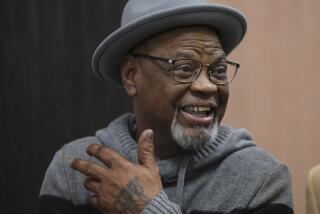‘Great Train Robbery’ perpetrator Ronnie Biggs is set free due to illness
- Share via
LONDON — For decades, Ronnie Biggs has been synonymous in Britain not only with the “Great Train Robbery” he helped commit but with the guile that enabled him to escape from prison after his conviction in 1964.
As a fugitive abroad, mostly in Australia and Brazil, he developed a cult-like status for his open defiance of British authorities, living a never less than colorful life in which he recorded with the Sex Pistols, charged tourists to spend time in his company and made a TV commercial for hair replacement.
When he returned to Britain in 2001, it was of his own will, knowing he would be arrested but in need of medical care and proclaiming his desire to once again walk into a pub and order a pint.
His wish never came true. Biggs was arrested and jailed on his return. His health continued to decline. Now, sick with pneumonia and weakened by strokes, he is unable to walk or feed himself.
Facing a prisoner unlikely to recover, much less pose a threat to society, British officials finally yielded Friday to Biggs’ long campaign for early release, citing “compassionate grounds” and withdrawing the guards at his hospital bedside.
It won’t make much difference to his lifestyle. Biggs will mark his 80th birthday today in his hospital bed. But his son Michael said that the formal issuing of walking papers would make a “spiritual” difference to his father.
“It smells of freedom,” Michael Biggs told reporters, waving in front of his nose the faxed order that made his father a free man, at least on paper. “Where’s the nearest pub?”
He said his father, strong enough to point at letters on a board to communicate, declared himself “over the moon” and shook hands with his guards before they left.
Today will be the 46th anniversary of the robbery that took place on Biggs’ 34th birthday. A gang of thieves pounced on the Royal Mail train heading to London from Glasgow, Scotland, and beat the train driver with an iron bar before making off with 2.6 million pounds, or well in excess of $65 million today. The driver never recovered fully from his injuries.
Biggs was caught, put on trial and sentenced to 30 years behind bars. But after only 15 months in a London prison, he escaped by scaling a wall and fleeing in a furniture van.
He spent the next 3 1/2 decades on the run, though the phrase doesn’t quite accurately depict the many years Biggs spent leisurely strolling the sunny beaches of Rio de Janeiro, enjoying a playboy lifestyle and recording “No One Is Innocent” with the Sex Pistols. Brazil refused to extradite him, and the way he was brazenly living large in plain view of British authorities inspired mostly head-shaking admiration back home -- but also anger at a convicted criminal mocking the law.
In 1981, British ex-soldiers kidnapped Biggs in Rio and took him to Barbados, allegedly hoping to strike a deal to turn him over to Britain. But Barbados police rescued him from a drifting yacht and shipped him back to Brazil.
In poor health, Biggs decided in 2001 that it was time to return to his homeland, though he expected to be arrested upon arrival. As his health worsened in the following years, family and friends lobbied for his release from prison. But officials repeatedly denied his parole application, declaring that Biggs had never showed any remorse for his crime.
The most recent rejection came July 1, when Justice Minister Jack Straw decided that Biggs remained “wholly unrepentant.”
Biggs’ own words would seem to support such a view.
“I don’t regret the fact that I was involved in the train robbery. As a matter of fact, I’m quite pleased with the idea I was involved, because it’s given me a little place in history, shall we say,” Biggs once told an interviewer. “I’ve made a mark for myself.”
Within hours of the announcement that he would be released from prison, the BBC was flooded with hundreds of e-mails from people criticizing the move. But Michael Biggs, the ex-convict’s son, said he didn’t care.
“Opinions are like boxers. We all have them. Some are just cleaner than others,” he said. “My father is now a free man. That’s all there is to it.”
--
More to Read
Sign up for Essential California
The most important California stories and recommendations in your inbox every morning.
You may occasionally receive promotional content from the Los Angeles Times.














